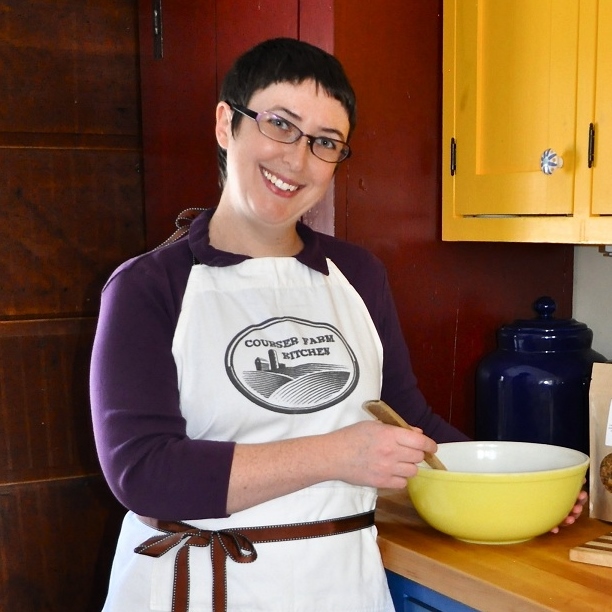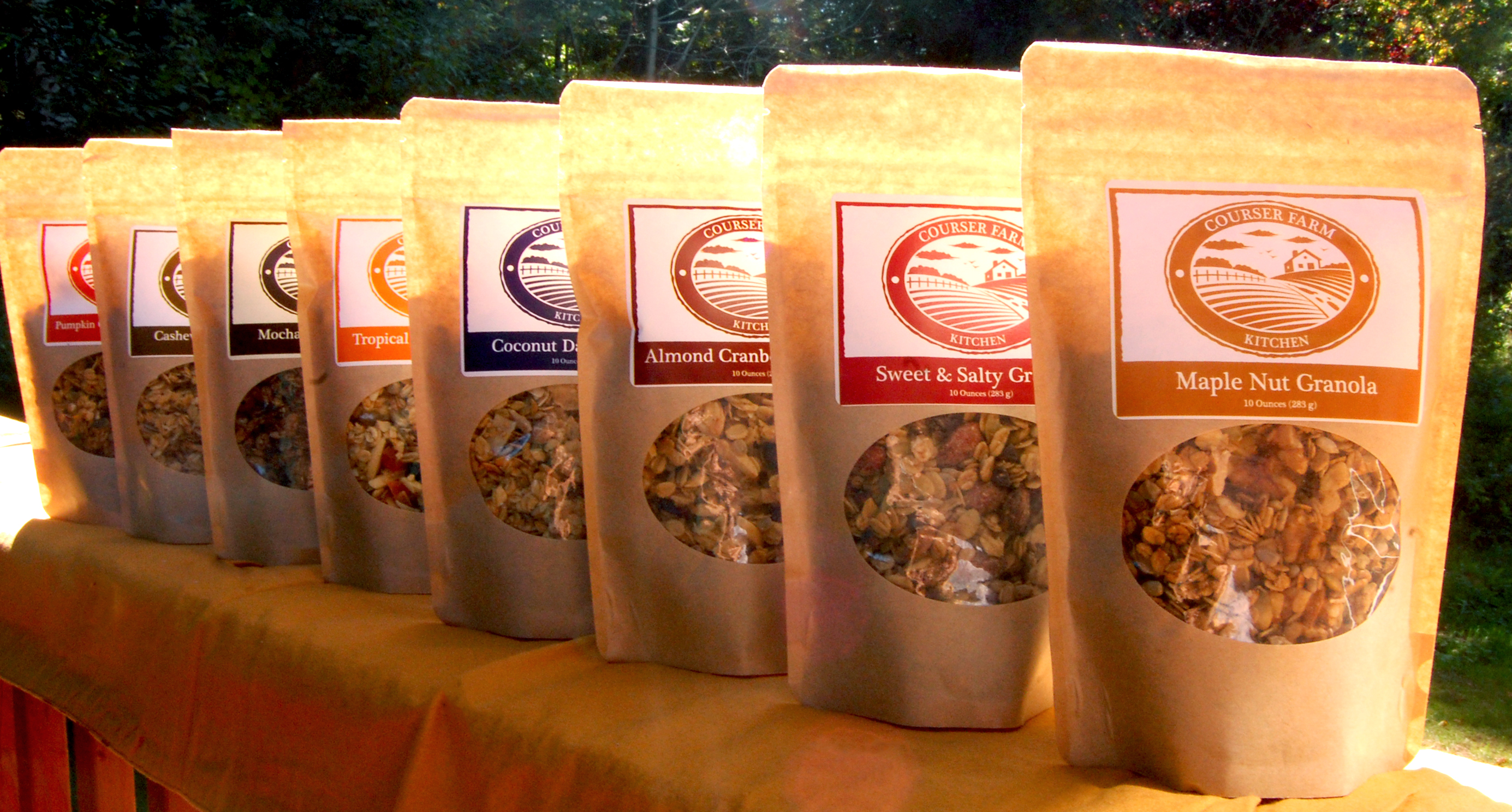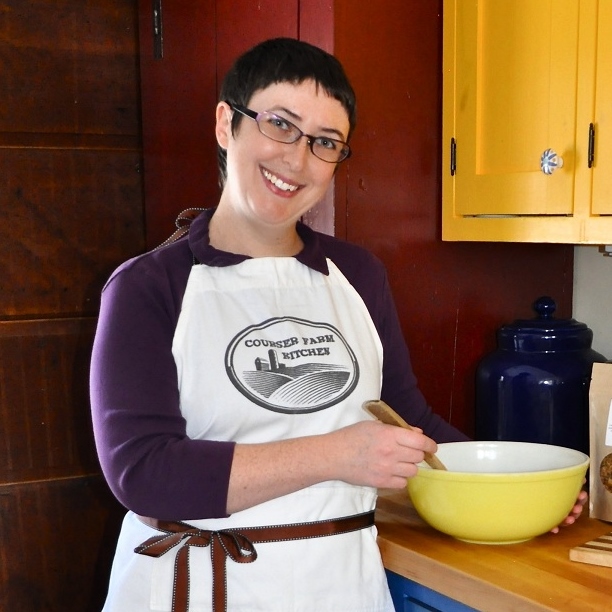
Have you ever been so overcome with excitement you couldn’t talk? In May, 2013, entrepreneur Emma Bates, who founded Courser Farm Kitchen, opened her email to discover a message from New Hampshire Magazine that Courser Farm Kitchen’s granola had won Editor’s Choice Best Granola.
About this heart-in-her-mouth experience, Emma writes on her blog: “I started jumping all around and screaming. My kids had no idea what was going on but they joined me in the jumping and screaming anyway. We all calmed down eventually and I was able to tell my family the big news.”
How did she reach this gratifying moment of success?
She had given up her book-binding business (yes, she had prior entrepreneurial experience) because it just wasn’t compatible with staying home and caring for her young children. She was making gluten-free and vegan baked goods for her family, and her aunt and uncle suggested she sell them in their coffee shop in Warner, New Hampshire. Because she needed a kitchen license she decided to branch out into farmers’ markets. Her muffins and cookies went over pretty well, but then one fateful day she offered granola. Customers wanted that!

Pretty soon the demand for her delicious, specialty granola (with enticing names like Mocha Chip, Cashew Chai, and Northern Berry Harvest) was so large that she didn’t have time to make anything else.
And that’s how gluten-free, vegan granola became the niche product of Courser Farm Kitchen. Customers loved it and they spread the word. She got so busy she needed to hire help, word spread and a regional distributor picked her up. Don’t you just love a good success story?
So, you’re thinking about getting into the baked-goods business? Emma has these points of advice:
- Food is easier to sell than crafts. Even in hard times, people need to eat. That’s good news. But be aware that profit margins are low in the food industry. Crunch your numbers, to make sure you can make a profit.
- Go to Farmer’s Markets and talk to vendors. You’ll find incredibly helpful people. Ask questions–how many people show up, what they buy, what it takes to succeed in this community. Research your local market before you jump in.
- Pick a targeted niche that meets a need. Cookies and cupcakes are commonplace. Offer something unique that people can’t find on every corner, something no one else is doing.
- Know that running a business takes time. It’s going to be a full-time job. If you’re a stay-at-home parent, that means you’ll be sacrificing family time (usually on evenings and weekends) while your spouse takes care of the children so you can tend to business.
- Great product merits word of mouth advertising. Give your customers what they want, and they’ll not only be loyal to you, they’ll promote you.
Is it worth the time and effort? Emma says she loves what she’s doing, although she’s not getting rich quick (remember that point about low profit-margins in the food business!) For her, as for many entrepreneurs, the intangible rewards are more important than the money. She says,
” I enjoy having something that’s mine. Stay-at-home moms often feel like nothing in their lives belongs exclusively to them–everything has been taken over [by your family’s and children’s needs]. In my business, I get to make the decisions. I’m in charge!”
She adds that one of her greatest rewards is the satisfaction of interacting with people who appreciate the work she does to fulfill a need for them. A local-food business is all about building personal relationships with customers, and she enjoys that.
So, in answer to the question of whether it’s worth it, I’d ask you this:
When is the last time you were so elated by your success, you simply had to jump around screaming for joy? Really, when?
You can order Emma’s scrumptious granola online, just click here. And check out her new grain-free, Paleo-friendly Western Cocoa Cayenne.


What a wonderful, heart-warming story sharing Emma’s ‘jumping and screaming for joy’ moment. I can just see it now, her reaction to that moment when she first opened that email! Very inspiring indeed.
I can certainly relate to the feeling of having something that belongs to just her. I feel that way about my blog and my writing. My baby!
I have to admit that I screamed for joy and jumped around when I took a call from the editor of a magazine to say that she wanted to publish my first-ever article. You never forget a moment like that 🙂
I wish Emma every success with her business.
You’re so right, Sherri, a person never does forget those jumping-for-joy affirmations.
And I wish you every success with your writing!
Thank you so very much Tracy.
Those are great tips and I’m passing them on to a woman who is starting up her own business – thank you!
Diana
Terrific! Thanks for passing them on, Diana.
I may be wrong or have the wrong company but I think Bear Naked products started as an at home thing too. Hard work and love of product always pays off.
I agree that passion for your product is necessary, as is hard work. One without the other won’t cut it.
I always get a huge kick out of it when home-based businesses really take off. It’s inspiring.
Reblogged this on Business Ideas and Beyond.
Thank you!
That’s gluten free? What an amazing looking gluten free treat!
I like the way you always publish such realistic advice on your blog, and your inspiring stories of how ordinary people’s dreams really do come true through hard work, good tactics, and basically all the other things you mention in your post.
Yep–gluten free! Isn’t that great!
Truth is very important to me, Denise. I detest the ploy of “tell ’em whatever they want to hear so they’ll give you their money!” I know it’s an easier-faster way to make a buck, but my reputation as a person of integrity is far more important to me than popularity or wealth. (Thanks for noticing!)
It’s terrible too the assumption that gluten free tends not to be as nice as other food – this is an assumption I make based on some of the food I see in packets 🙁 It’s nice to see someone making light, tasty looking, attractive gluten free.
Isn’t it weird what people go for? You get proper, measured from the head and heart advice like yours. And then you see these sites offering totally sanitised, generic “advice” on “how to” do things and they receive hundreds of likes and comments and I am thinking “Why?????” “What??? “How?????” because there seems no value or originality in the content.
You’d love Emma, Denise. It’s not only that her product is great, she’s also a great, high-quality person.
In answer to your question “why, what, how?”
The largest demographic–the majority–wants what appears to be easy, what will make them feel as if their dream is definitely possible, without a lot of effort or risk. They want to believe they’ll achieve their goal or get what they want by spending five minutes a day for thirty days repeating, “I think I can, I think I can,” and then all they have to do is take a short course and pass a test.
Why are people like that? It goes back to very old philosophy — the notion that people who seek truth are going to be seen as eccentric; they’re not going to be popular, and very few people will want to hear what they have to say.
I’ve finally accepted that it’s something I can’t change. I’m interested in the truth-seekers.
If I wanted to make a lot of money, to get rich beyond my wildest dreams, I’d lie to people about what it takes to get rich and famous. I’d assure them that it’s easy–all they have to do is buy into my program.
I’d tell them if they write a book, they’ll get fabulously rich, and I’d teach a webinar about how to write a book in 8 months and how to get it published). I’d drive around in a fancy car and wear fancy clothes and tell them I live in a 6,000 square-foot house and I got all by writing and selling my book. I’d smile at them and promise them the moon for $100 down and $100 a month and after they finish their book, I’d take only $5000 to publish it for them. I could do that.
But I’d loathe myself forever.
Your scenario is depressingly plausible.
The truth is too many sided to grasp, but looking for it gives us something in common.
Right–I’m not interested in the people who always think they know the whole truth (I never trust that attitude) — I’m interested in the seekers.
What a motivating success story! I’ve always been impressed by people who have the wherewithal to start up their own business. As a baker its is even more inspiring to hear about the path to commercializing your hobby. Excellent tips to think hard about before beginning down the journey. Now you’ve got me thinking about what my niche would be if I decided to try and sell baked goods!
I was thinking of YOU when I wrote this, Heather. Glad you popped in!
The best way to find a niche is to look around your area, ask a lot of questions (perhaps even do a survey at farmer’s markets?), and find out what people would like to have, but can’t usually find. I do know that local is IN, so locally-sourced flour/grain, sugar (or maple syrup), dairy, dried fruits, etc. is a niche; so is a specialized product for a specialized purpose, demographic or occasion.
Of course, you have to make sure your niche is large enough to sustain your business….
Well done to Emma. Her granola sounds delicious and very healthy.
Thanks for stopping by, B. She IS a fabulous person, doing a stellar job!
I love to see a success story like this! Congratulations to Emma (her products look so good) and thanks to you both for sharing these words of wisdom.
It’s so interesting to hear the point of view of the person on the other side of the Farmer’s Market stall. I love the names she’s picked for her products. I’d be persuaded to buy by those alone (not to speak of how great it looks).
She’s done a great job with the packaging/branding, I think!
And yes, the other side of the stall is always an interesting perspective. The seller HAS to think about what the buyer perceives, but often, the buyer doesn’t think very much about what’s going on with the seller, except in Farmer’s Markets and local shops, where people tend to get to know one another on a personal level…
Jumping around screaming with joy….. now that is definitely something to aim for.
I know! I realized that it’s been a long, long time since I’ve done that. I know that I’ve gotten less spontaneous, less sentimental, less emotional as I’ve aged.
It seems so unbecoming for “a woman of a certain age” to jump and scream. But there must be some place it would be appropriate. (But not on a game show, in front of a national television audience!)
Not to sound like a Bryan Bummer, but not since high school. I’m 35 now. It’s been awhile. This is sad, I know.
Well, Bryan–I’m thinking it hasn’t been since high school for me, either. And I’ve got a few years on you.
I’m trying to think, right now, of when and where I could let myself go, jump and dance for joy. I mean, David the King did it all his life long!
I have way too much consciousness of feeling silly/childish. I can, however, get deeply into dancing–so that’s where I’m going to start… maybe I’ll get the hang of it!
I have no issue feeling silly / childish. My wife will tell that’s natural for me (an annoying for her). I just haven’t had a big accomplishment. Maybe that gives me something to strive for in 2014? To win something or do something great!
Possibly–depends on what you mean by “strive.” Goals are a good thing, I think. But striving can become counter-productive in the bigger picture of a worthwhile life, which I know you’re in tune with.
Very interesting story combined with very practical advice.
I ha fun at church one day. Our church phone books had been delivered. From the lectern I did an impression if Steve Martin jumping up and down saying “the new phone books are in, the new phone books are in”.
Sometimes we need to let our silly out.
That’s awesome.
I do that every year when the phone book arrives (my husband is really tired of it). I never thought about doing it in church!
Good for her! And what a nice story with a happy ending.
The last time I jumped? I wish I had the strength to jump. Since Sofia set her paws in my house, everything has been so exhausting! 😉
Where’s Stefano? Isn’t he the one who talked Her Majesty into talking you into Sophia?
I have to admit that he helps a lot when he is around. The point is: he is never around!!! He is either abroad (he travels a lot) or at work. 🙂
I understand–it’s the lot of us stay-at-home parents.
Good that he helps when he’s around. Otherwise I’d have to give him a talking-to. 😉
Brava, Emma and Tracy, for this excellent post. I’m already a huge fan of Tracy’s recipes–for food and for successful weekends in B&Bs!–and yes, I do get so excited that I jump around , singing and whooping for joy. It’s with my writing, though, but any act of our creativity that brings this joy is a very, very good thing!
How exciting, Emma Bates. If I was there with you, I would have been yelling and screaming, too. Best wishes for your success. Her granola recipes – especially the Mocha Chip – sound delicious.
The suggestions are great. They are very practical and provide useful advice.
My daughter’s RI jewelry biz also took time and benefited from word of mouth. She enjoys it, but I often wonder if other people who love doing something and then turn it into a business end up not loving it anymore. Does it just become a chore?
I think there’s always that risk, that the business becomes just business and the joy evaporates.
My hunch (which is probably more than a hunch, since it’s based on personal experience and much observation) is that it will work for a creative person to turn a hobby into a business, only if that person actually enjoys “business.”
We used to “play business” when I was a child. We’d carry around briefcases, play with adding machines, write up sales receipts…. and therefore all my various enterprises have always retained a feeling of fun for me. My hunch is that S. enjoys the business game, too. Not everyone does.
I think you are right!